In-depth Case Study of ASIC v Flugge & Geary [2016] VSC 779 Law
VerifiedAdded on 2024/07/29
|13
|2705
|403
Case Study
AI Summary
This case study provides a detailed analysis of ASIC v Flugge & Geary [2016] VSC 779, a significant case in Australian corporations law. The case revolves around allegations by the Australian Securities and Investment Commission (ASIC) that Trevor James Flugge, former director and chairman of AWB Limited, and Peter Geary, a former senior officer, breached their duties under sections 180 and 181 of the Corporations Act 2001. The allegations stem from payments made by AWB to Iraq under the United Nations Oil for Food Program, specifically concerning inland transportation charges. ASIC contended that these payments contravened UN sanctions, and that Mr. Flugge failed to adequately investigate the legitimacy of these payments despite being aware of potential improprieties. The court found that Mr. Flugge did breach his duties under section 180 by failing to exercise reasonable care and diligence, imposing a penalty and disqualification period. The study discusses the court's decision, the duties breached, and the relevancy of the case to corporate governance and compliance with regulatory standards, highlighting the importance of directors' responsibilities in upholding legal and ethical conduct.
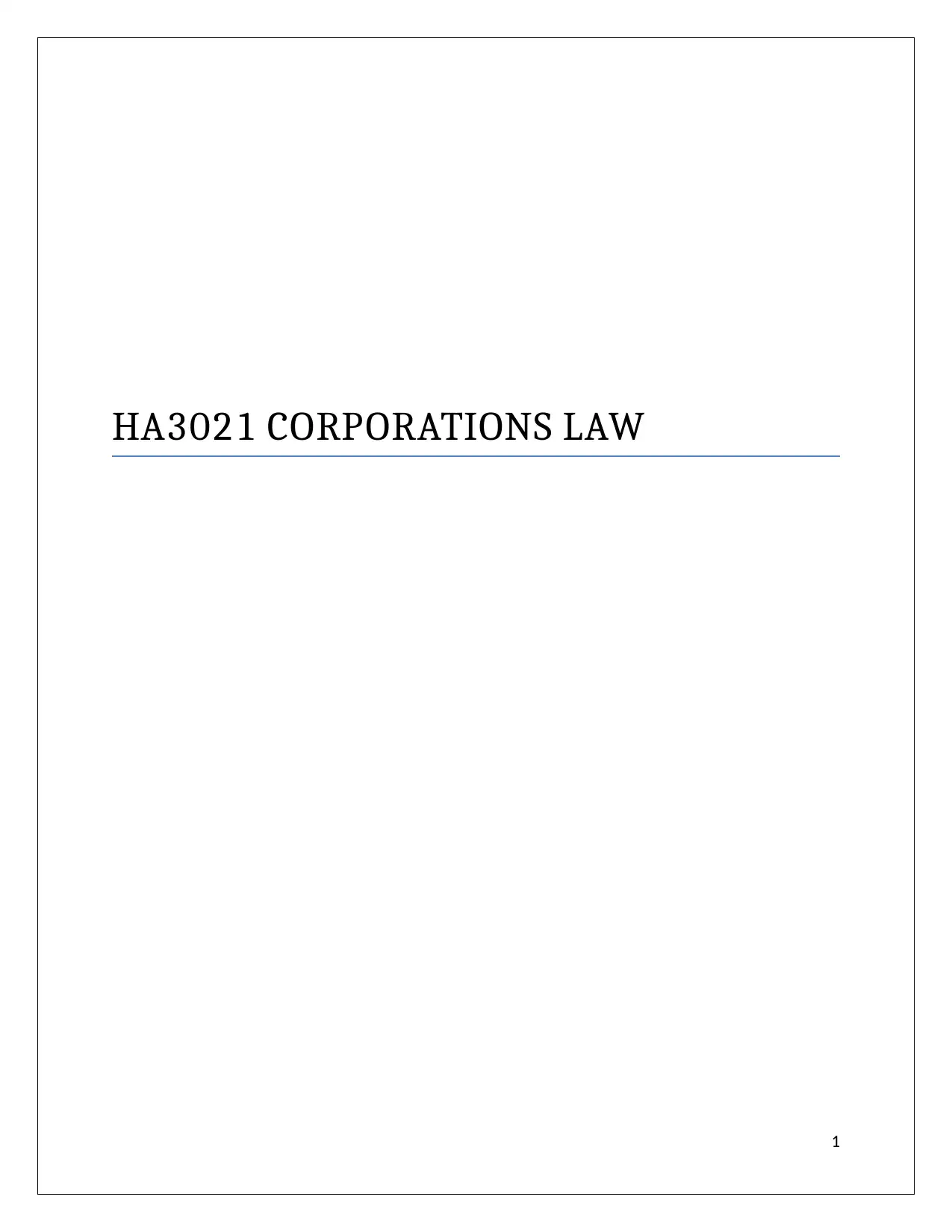
HA3021 CORPORATIONS LAW
1
1
Paraphrase This Document
Need a fresh take? Get an instant paraphrase of this document with our AI Paraphraser
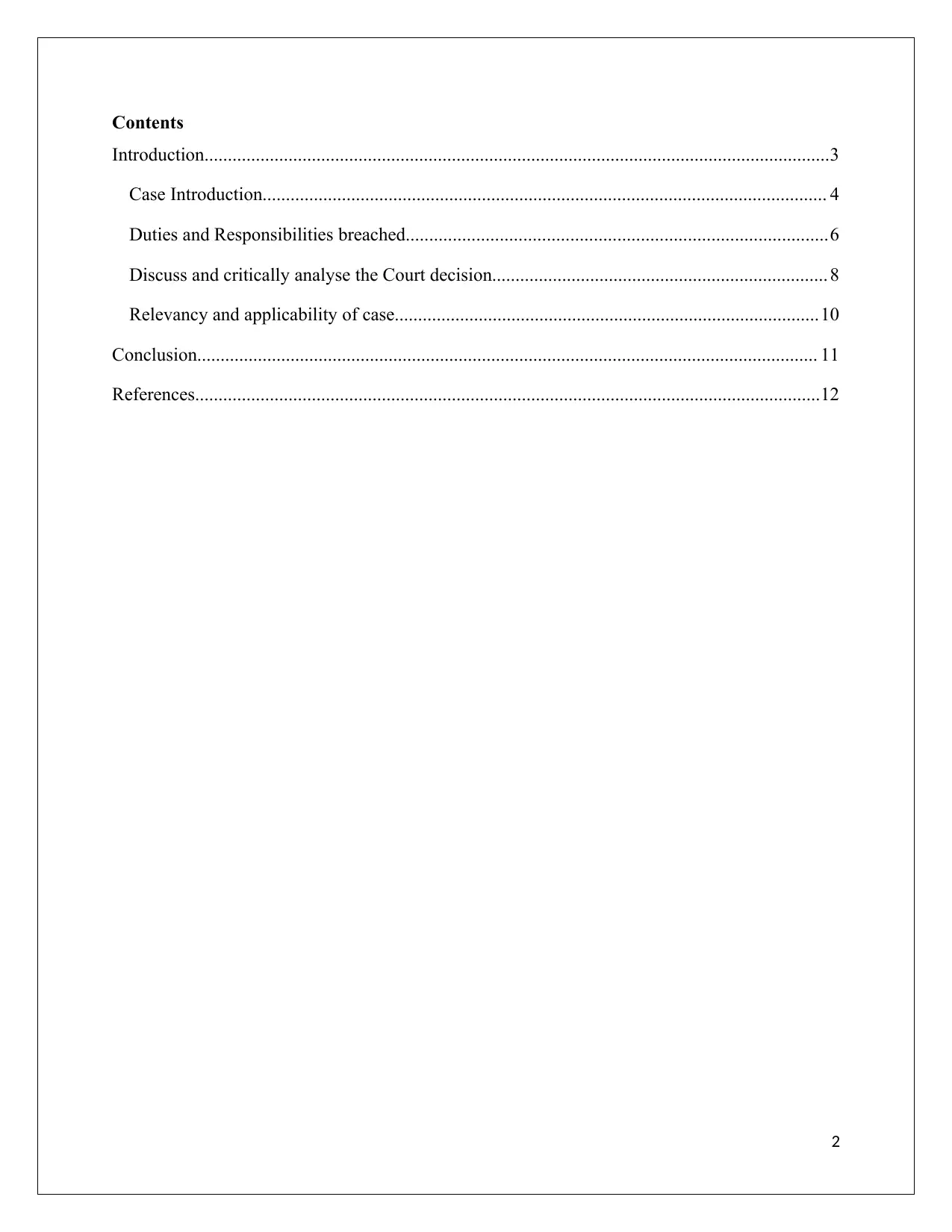
Contents
Introduction......................................................................................................................................3
Case Introduction......................................................................................................................... 4
Duties and Responsibilities breached..........................................................................................6
Discuss and critically analyse the Court decision........................................................................ 8
Relevancy and applicability of case...........................................................................................10
Conclusion..................................................................................................................................... 11
References......................................................................................................................................12
2
Introduction......................................................................................................................................3
Case Introduction......................................................................................................................... 4
Duties and Responsibilities breached..........................................................................................6
Discuss and critically analyse the Court decision........................................................................ 8
Relevancy and applicability of case...........................................................................................10
Conclusion..................................................................................................................................... 11
References......................................................................................................................................12
2
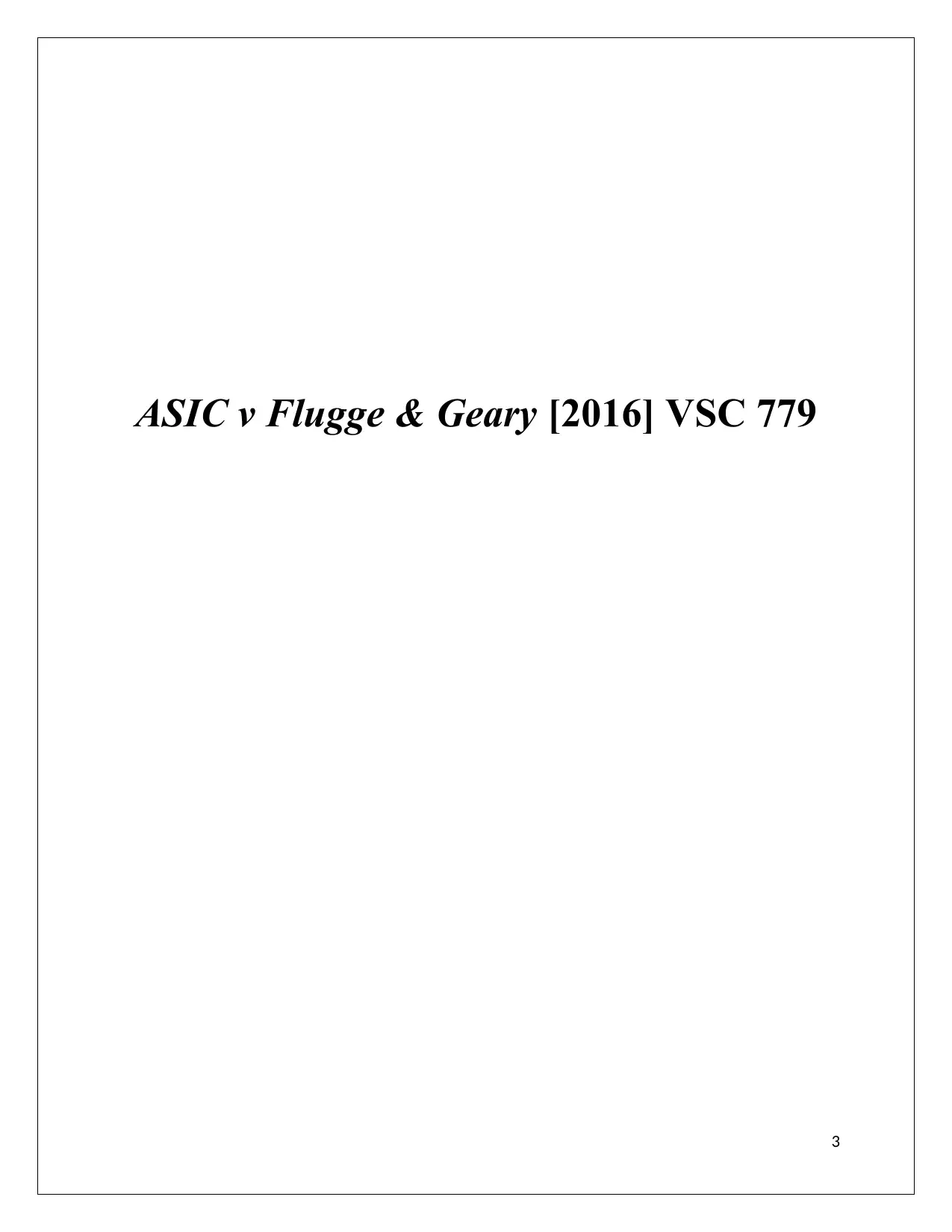
ASIC v Flugge & Geary [2016] VSC 779
3
3
⊘ This is a preview!⊘
Do you want full access?
Subscribe today to unlock all pages.

Trusted by 1+ million students worldwide
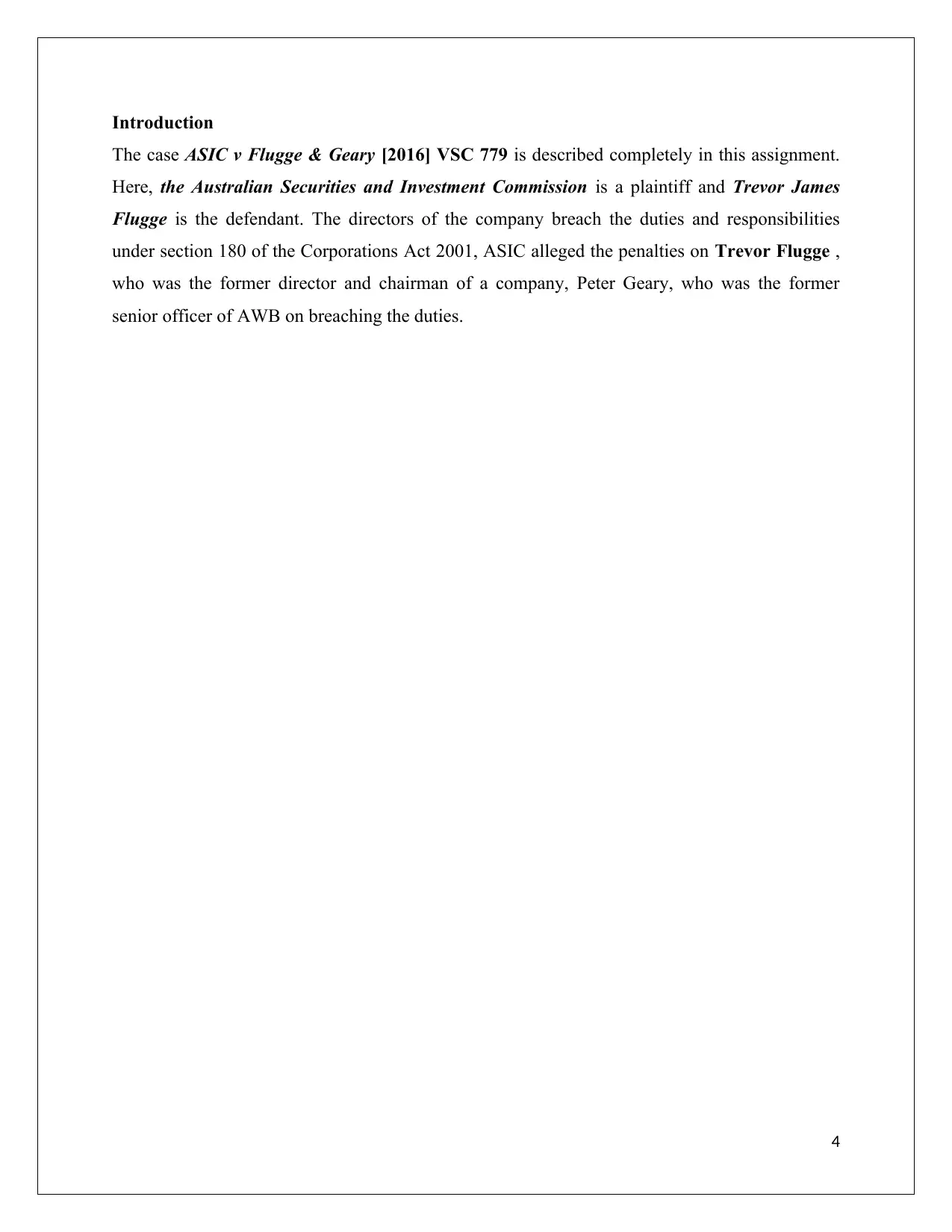
Introduction
The case ASIC v Flugge & Geary [2016] VSC 779 is described completely in this assignment.
Here, the Australian Securities and Investment Commission is a plaintiff and Trevor James
Flugge is the defendant. The directors of the company breach the duties and responsibilities
under section 180 of the Corporations Act 2001, ASIC alleged the penalties on Trevor Flugge ,
who was the former director and chairman of a company, Peter Geary, who was the former
senior officer of AWB on breaching the duties.
4
The case ASIC v Flugge & Geary [2016] VSC 779 is described completely in this assignment.
Here, the Australian Securities and Investment Commission is a plaintiff and Trevor James
Flugge is the defendant. The directors of the company breach the duties and responsibilities
under section 180 of the Corporations Act 2001, ASIC alleged the penalties on Trevor Flugge ,
who was the former director and chairman of a company, Peter Geary, who was the former
senior officer of AWB on breaching the duties.
4
Paraphrase This Document
Need a fresh take? Get an instant paraphrase of this document with our AI Paraphraser
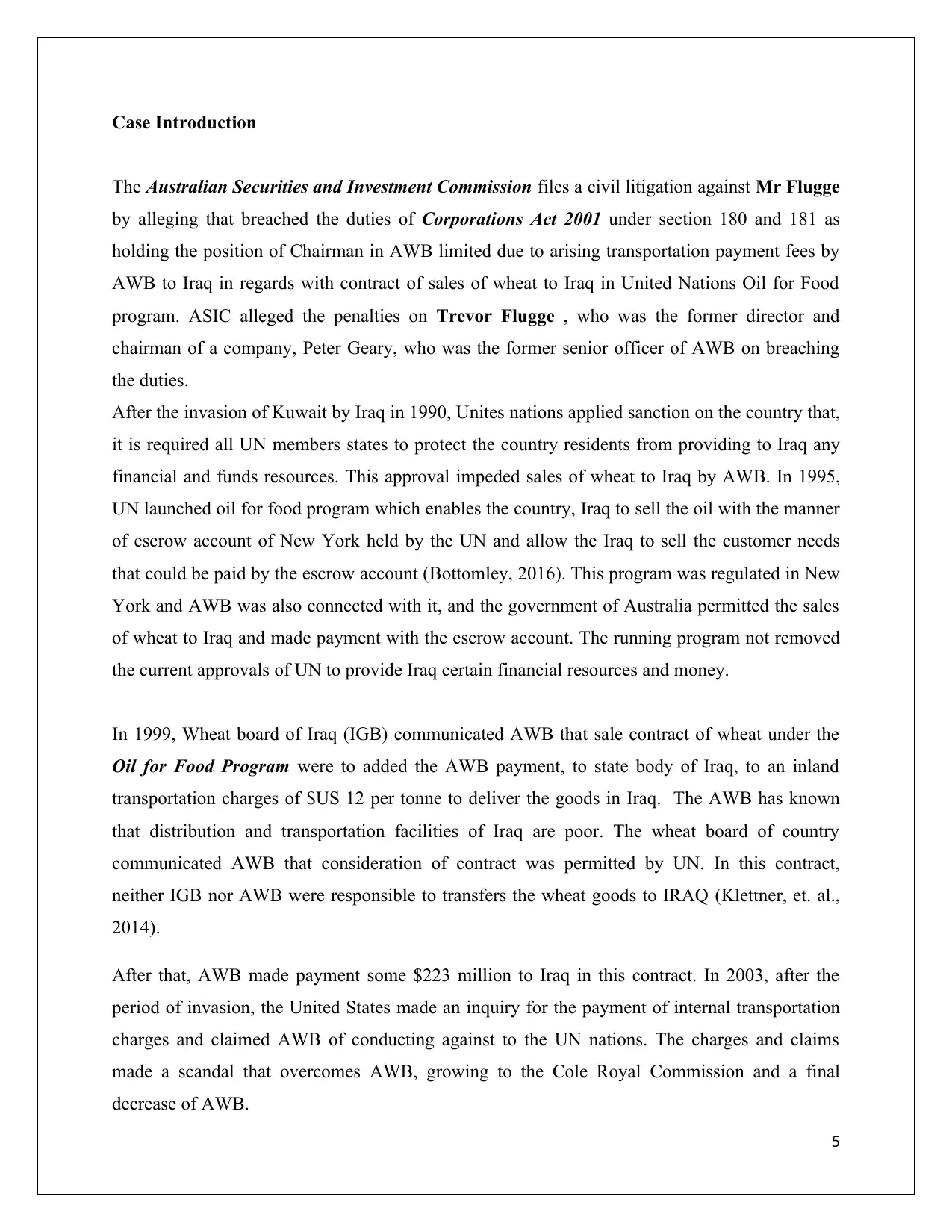
Case Introduction
The Australian Securities and Investment Commission files a civil litigation against Mr Flugge
by alleging that breached the duties of Corporations Act 2001 under section 180 and 181 as
holding the position of Chairman in AWB limited due to arising transportation payment fees by
AWB to Iraq in regards with contract of sales of wheat to Iraq in United Nations Oil for Food
program. ASIC alleged the penalties on Trevor Flugge , who was the former director and
chairman of a company, Peter Geary, who was the former senior officer of AWB on breaching
the duties.
After the invasion of Kuwait by Iraq in 1990, Unites nations applied sanction on the country that,
it is required all UN members states to protect the country residents from providing to Iraq any
financial and funds resources. This approval impeded sales of wheat to Iraq by AWB. In 1995,
UN launched oil for food program which enables the country, Iraq to sell the oil with the manner
of escrow account of New York held by the UN and allow the Iraq to sell the customer needs
that could be paid by the escrow account (Bottomley, 2016). This program was regulated in New
York and AWB was also connected with it, and the government of Australia permitted the sales
of wheat to Iraq and made payment with the escrow account. The running program not removed
the current approvals of UN to provide Iraq certain financial resources and money.
In 1999, Wheat board of Iraq (IGB) communicated AWB that sale contract of wheat under the
Oil for Food Program were to added the AWB payment, to state body of Iraq, to an inland
transportation charges of $US 12 per tonne to deliver the goods in Iraq. The AWB has known
that distribution and transportation facilities of Iraq are poor. The wheat board of country
communicated AWB that consideration of contract was permitted by UN. In this contract,
neither IGB nor AWB were responsible to transfers the wheat goods to IRAQ (Klettner, et. al.,
2014).
After that, AWB made payment some $223 million to Iraq in this contract. In 2003, after the
period of invasion, the United States made an inquiry for the payment of internal transportation
charges and claimed AWB of conducting against to the UN nations. The charges and claims
made a scandal that overcomes AWB, growing to the Cole Royal Commission and a final
decrease of AWB.
5
The Australian Securities and Investment Commission files a civil litigation against Mr Flugge
by alleging that breached the duties of Corporations Act 2001 under section 180 and 181 as
holding the position of Chairman in AWB limited due to arising transportation payment fees by
AWB to Iraq in regards with contract of sales of wheat to Iraq in United Nations Oil for Food
program. ASIC alleged the penalties on Trevor Flugge , who was the former director and
chairman of a company, Peter Geary, who was the former senior officer of AWB on breaching
the duties.
After the invasion of Kuwait by Iraq in 1990, Unites nations applied sanction on the country that,
it is required all UN members states to protect the country residents from providing to Iraq any
financial and funds resources. This approval impeded sales of wheat to Iraq by AWB. In 1995,
UN launched oil for food program which enables the country, Iraq to sell the oil with the manner
of escrow account of New York held by the UN and allow the Iraq to sell the customer needs
that could be paid by the escrow account (Bottomley, 2016). This program was regulated in New
York and AWB was also connected with it, and the government of Australia permitted the sales
of wheat to Iraq and made payment with the escrow account. The running program not removed
the current approvals of UN to provide Iraq certain financial resources and money.
In 1999, Wheat board of Iraq (IGB) communicated AWB that sale contract of wheat under the
Oil for Food Program were to added the AWB payment, to state body of Iraq, to an inland
transportation charges of $US 12 per tonne to deliver the goods in Iraq. The AWB has known
that distribution and transportation facilities of Iraq are poor. The wheat board of country
communicated AWB that consideration of contract was permitted by UN. In this contract,
neither IGB nor AWB were responsible to transfers the wheat goods to IRAQ (Klettner, et. al.,
2014).
After that, AWB made payment some $223 million to Iraq in this contract. In 2003, after the
period of invasion, the United States made an inquiry for the payment of internal transportation
charges and claimed AWB of conducting against to the UN nations. The charges and claims
made a scandal that overcomes AWB, growing to the Cole Royal Commission and a final
decrease of AWB.
5
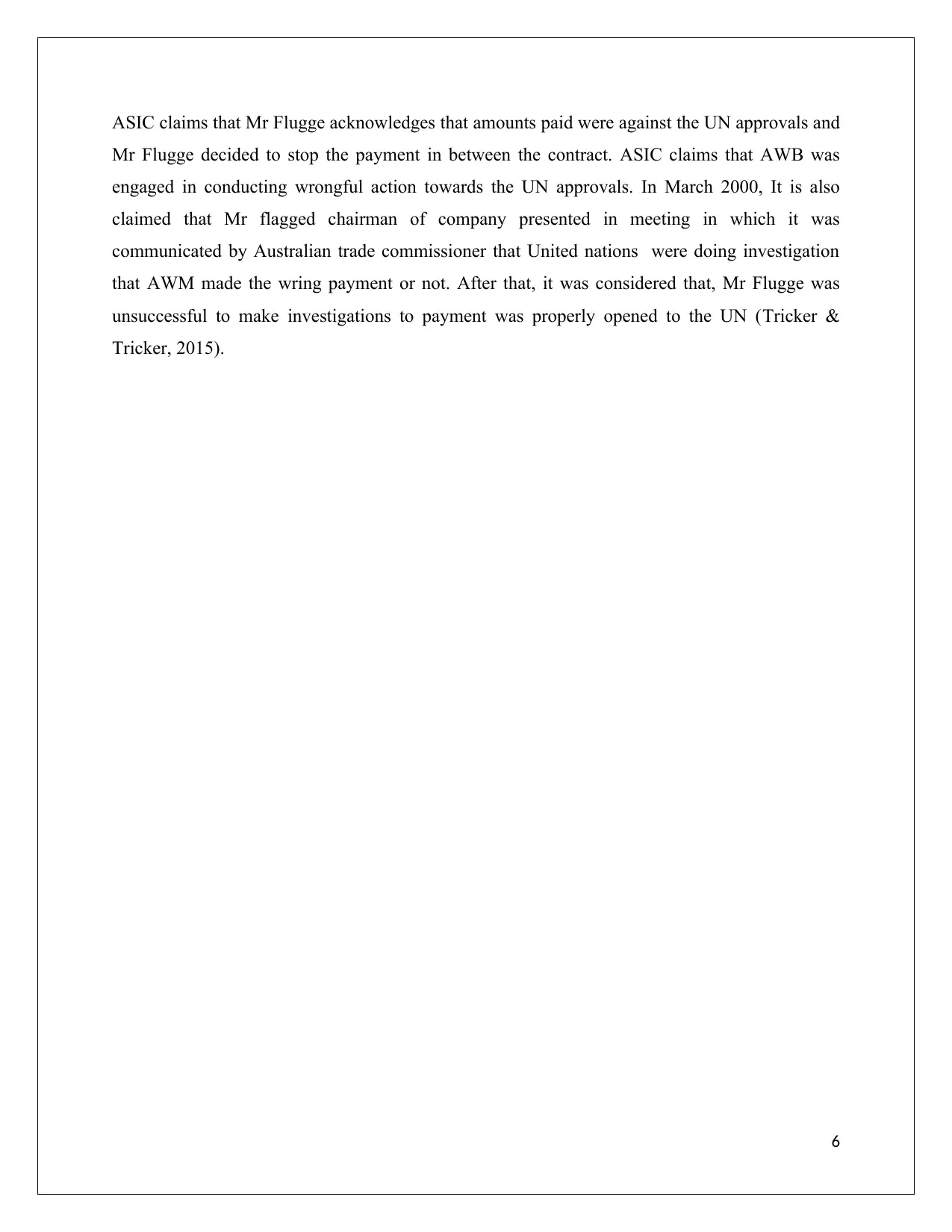
ASIC claims that Mr Flugge acknowledges that amounts paid were against the UN approvals and
Mr Flugge decided to stop the payment in between the contract. ASIC claims that AWB was
engaged in conducting wrongful action towards the UN approvals. In March 2000, It is also
claimed that Mr flagged chairman of company presented in meeting in which it was
communicated by Australian trade commissioner that United nations were doing investigation
that AWM made the wring payment or not. After that, it was considered that, Mr Flugge was
unsuccessful to make investigations to payment was properly opened to the UN (Tricker &
Tricker, 2015).
6
Mr Flugge decided to stop the payment in between the contract. ASIC claims that AWB was
engaged in conducting wrongful action towards the UN approvals. In March 2000, It is also
claimed that Mr flagged chairman of company presented in meeting in which it was
communicated by Australian trade commissioner that United nations were doing investigation
that AWM made the wring payment or not. After that, it was considered that, Mr Flugge was
unsuccessful to make investigations to payment was properly opened to the UN (Tricker &
Tricker, 2015).
6
⊘ This is a preview!⊘
Do you want full access?
Subscribe today to unlock all pages.

Trusted by 1+ million students worldwide
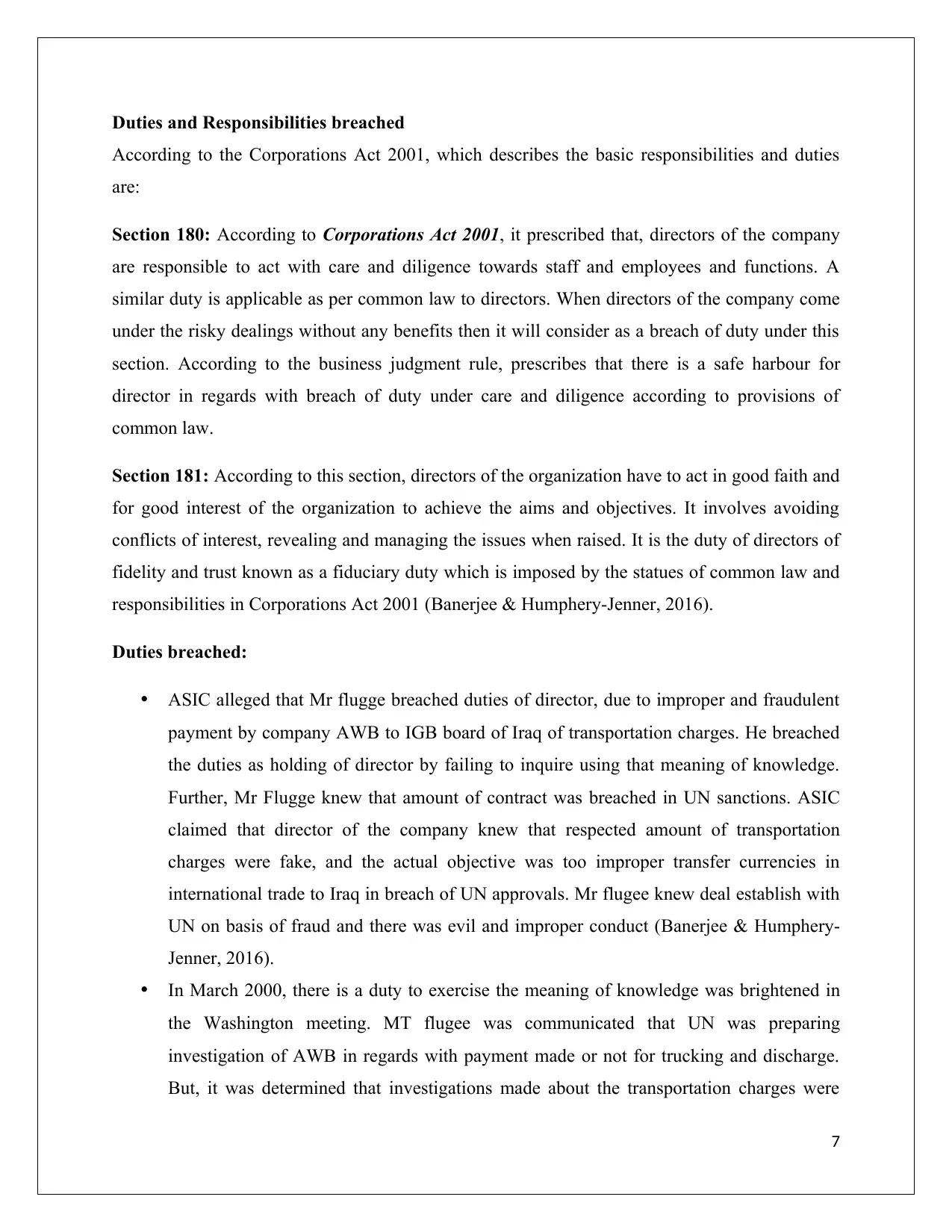
Duties and Responsibilities breached
According to the Corporations Act 2001, which describes the basic responsibilities and duties
are:
Section 180: According to Corporations Act 2001, it prescribed that, directors of the company
are responsible to act with care and diligence towards staff and employees and functions. A
similar duty is applicable as per common law to directors. When directors of the company come
under the risky dealings without any benefits then it will consider as a breach of duty under this
section. According to the business judgment rule, prescribes that there is a safe harbour for
director in regards with breach of duty under care and diligence according to provisions of
common law.
Section 181: According to this section, directors of the organization have to act in good faith and
for good interest of the organization to achieve the aims and objectives. It involves avoiding
conflicts of interest, revealing and managing the issues when raised. It is the duty of directors of
fidelity and trust known as a fiduciary duty which is imposed by the statues of common law and
responsibilities in Corporations Act 2001 (Banerjee & Humphery-Jenner, 2016).
Duties breached:
ASIC alleged that Mr flugge breached duties of director, due to improper and fraudulent
payment by company AWB to IGB board of Iraq of transportation charges. He breached
the duties as holding of director by failing to inquire using that meaning of knowledge.
Further, Mr Flugge knew that amount of contract was breached in UN sanctions. ASIC
claimed that director of the company knew that respected amount of transportation
charges were fake, and the actual objective was too improper transfer currencies in
international trade to Iraq in breach of UN approvals. Mr flugee knew deal establish with
UN on basis of fraud and there was evil and improper conduct (Banerjee & Humphery-
Jenner, 2016).
In March 2000, there is a duty to exercise the meaning of knowledge was brightened in
the Washington meeting. MT flugee was communicated that UN was preparing
investigation of AWB in regards with payment made or not for trucking and discharge.
But, it was determined that investigations made about the transportation charges were
7
According to the Corporations Act 2001, which describes the basic responsibilities and duties
are:
Section 180: According to Corporations Act 2001, it prescribed that, directors of the company
are responsible to act with care and diligence towards staff and employees and functions. A
similar duty is applicable as per common law to directors. When directors of the company come
under the risky dealings without any benefits then it will consider as a breach of duty under this
section. According to the business judgment rule, prescribes that there is a safe harbour for
director in regards with breach of duty under care and diligence according to provisions of
common law.
Section 181: According to this section, directors of the organization have to act in good faith and
for good interest of the organization to achieve the aims and objectives. It involves avoiding
conflicts of interest, revealing and managing the issues when raised. It is the duty of directors of
fidelity and trust known as a fiduciary duty which is imposed by the statues of common law and
responsibilities in Corporations Act 2001 (Banerjee & Humphery-Jenner, 2016).
Duties breached:
ASIC alleged that Mr flugge breached duties of director, due to improper and fraudulent
payment by company AWB to IGB board of Iraq of transportation charges. He breached
the duties as holding of director by failing to inquire using that meaning of knowledge.
Further, Mr Flugge knew that amount of contract was breached in UN sanctions. ASIC
claimed that director of the company knew that respected amount of transportation
charges were fake, and the actual objective was too improper transfer currencies in
international trade to Iraq in breach of UN approvals. Mr flugee knew deal establish with
UN on basis of fraud and there was evil and improper conduct (Banerjee & Humphery-
Jenner, 2016).
In March 2000, there is a duty to exercise the meaning of knowledge was brightened in
the Washington meeting. MT flugee was communicated that UN was preparing
investigation of AWB in regards with payment made or not for trucking and discharge.
But, it was determined that investigations made about the transportation charges were
7
Paraphrase This Document
Need a fresh take? Get an instant paraphrase of this document with our AI Paraphraser
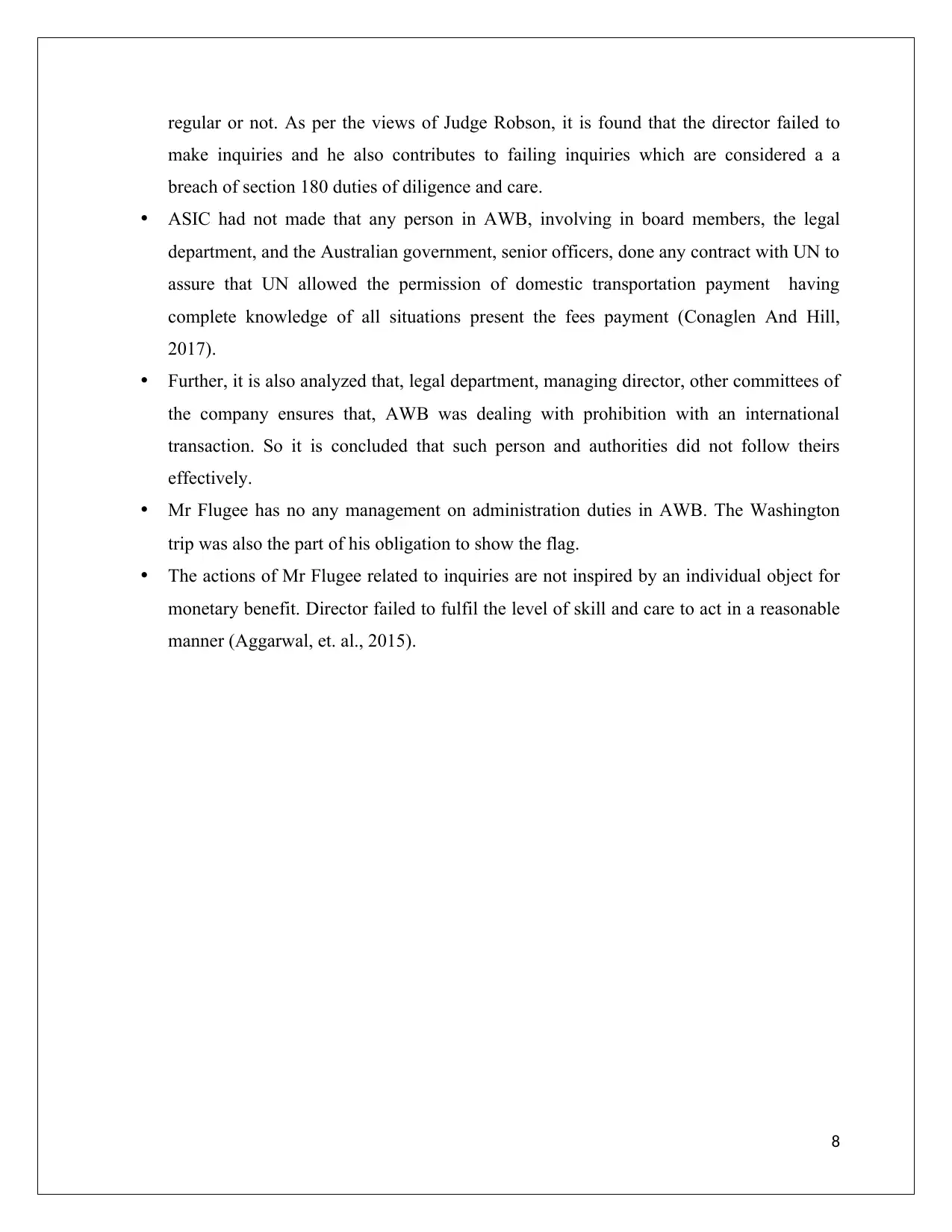
regular or not. As per the views of Judge Robson, it is found that the director failed to
make inquiries and he also contributes to failing inquiries which are considered a a
breach of section 180 duties of diligence and care.
ASIC had not made that any person in AWB, involving in board members, the legal
department, and the Australian government, senior officers, done any contract with UN to
assure that UN allowed the permission of domestic transportation payment having
complete knowledge of all situations present the fees payment (Conaglen And Hill,
2017).
Further, it is also analyzed that, legal department, managing director, other committees of
the company ensures that, AWB was dealing with prohibition with an international
transaction. So it is concluded that such person and authorities did not follow theirs
effectively.
Mr Flugee has no any management on administration duties in AWB. The Washington
trip was also the part of his obligation to show the flag.
The actions of Mr Flugee related to inquiries are not inspired by an individual object for
monetary benefit. Director failed to fulfil the level of skill and care to act in a reasonable
manner (Aggarwal, et. al., 2015).
8
make inquiries and he also contributes to failing inquiries which are considered a a
breach of section 180 duties of diligence and care.
ASIC had not made that any person in AWB, involving in board members, the legal
department, and the Australian government, senior officers, done any contract with UN to
assure that UN allowed the permission of domestic transportation payment having
complete knowledge of all situations present the fees payment (Conaglen And Hill,
2017).
Further, it is also analyzed that, legal department, managing director, other committees of
the company ensures that, AWB was dealing with prohibition with an international
transaction. So it is concluded that such person and authorities did not follow theirs
effectively.
Mr Flugee has no any management on administration duties in AWB. The Washington
trip was also the part of his obligation to show the flag.
The actions of Mr Flugee related to inquiries are not inspired by an individual object for
monetary benefit. Director failed to fulfil the level of skill and care to act in a reasonable
manner (Aggarwal, et. al., 2015).
8
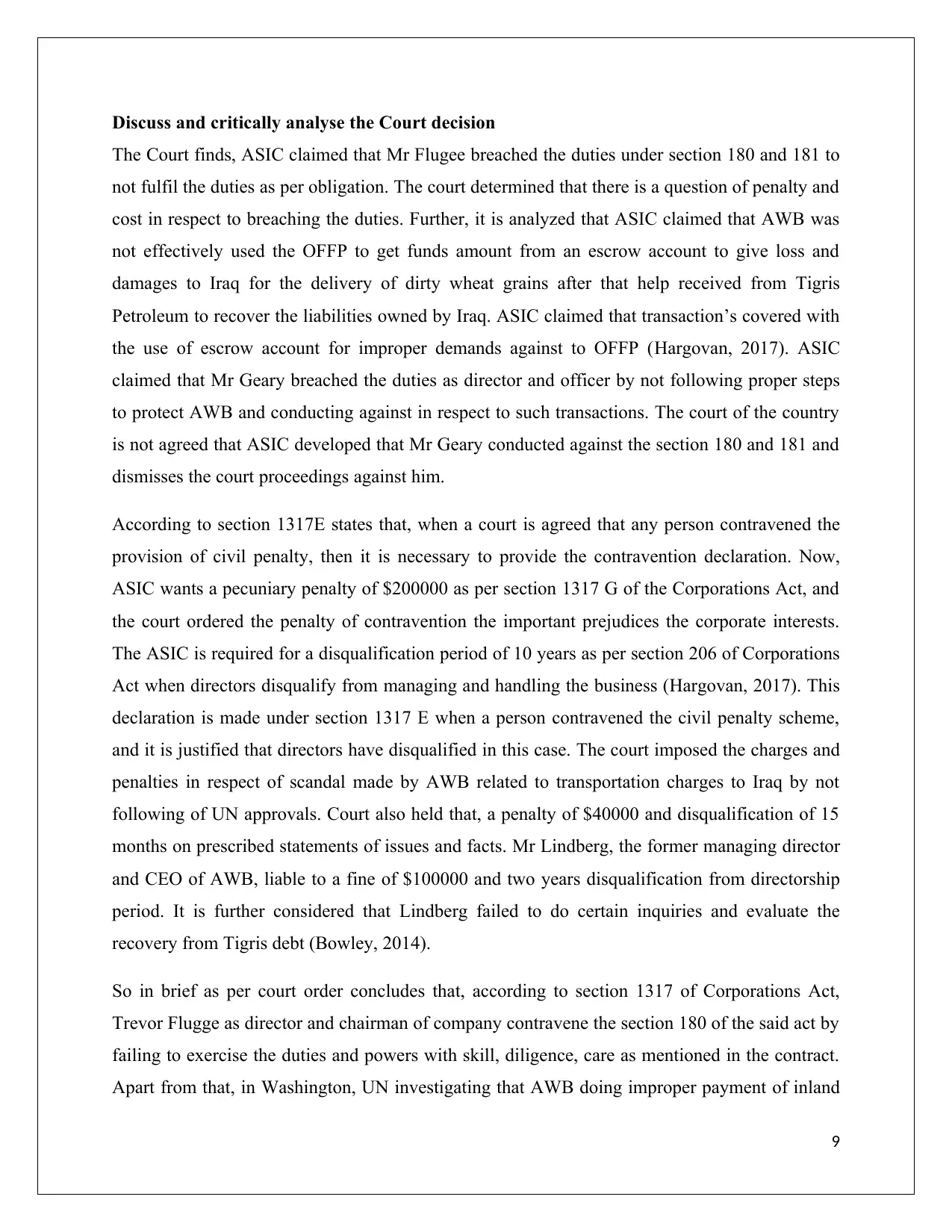
Discuss and critically analyse the Court decision
The Court finds, ASIC claimed that Mr Flugee breached the duties under section 180 and 181 to
not fulfil the duties as per obligation. The court determined that there is a question of penalty and
cost in respect to breaching the duties. Further, it is analyzed that ASIC claimed that AWB was
not effectively used the OFFP to get funds amount from an escrow account to give loss and
damages to Iraq for the delivery of dirty wheat grains after that help received from Tigris
Petroleum to recover the liabilities owned by Iraq. ASIC claimed that transaction’s covered with
the use of escrow account for improper demands against to OFFP (Hargovan, 2017). ASIC
claimed that Mr Geary breached the duties as director and officer by not following proper steps
to protect AWB and conducting against in respect to such transactions. The court of the country
is not agreed that ASIC developed that Mr Geary conducted against the section 180 and 181 and
dismisses the court proceedings against him.
According to section 1317E states that, when a court is agreed that any person contravened the
provision of civil penalty, then it is necessary to provide the contravention declaration. Now,
ASIC wants a pecuniary penalty of $200000 as per section 1317 G of the Corporations Act, and
the court ordered the penalty of contravention the important prejudices the corporate interests.
The ASIC is required for a disqualification period of 10 years as per section 206 of Corporations
Act when directors disqualify from managing and handling the business (Hargovan, 2017). This
declaration is made under section 1317 E when a person contravened the civil penalty scheme,
and it is justified that directors have disqualified in this case. The court imposed the charges and
penalties in respect of scandal made by AWB related to transportation charges to Iraq by not
following of UN approvals. Court also held that, a penalty of $40000 and disqualification of 15
months on prescribed statements of issues and facts. Mr Lindberg, the former managing director
and CEO of AWB, liable to a fine of $100000 and two years disqualification from directorship
period. It is further considered that Lindberg failed to do certain inquiries and evaluate the
recovery from Tigris debt (Bowley, 2014).
So in brief as per court order concludes that, according to section 1317 of Corporations Act,
Trevor Flugge as director and chairman of company contravene the section 180 of the said act by
failing to exercise the duties and powers with skill, diligence, care as mentioned in the contract.
Apart from that, in Washington, UN investigating that AWB doing improper payment of inland
9
The Court finds, ASIC claimed that Mr Flugee breached the duties under section 180 and 181 to
not fulfil the duties as per obligation. The court determined that there is a question of penalty and
cost in respect to breaching the duties. Further, it is analyzed that ASIC claimed that AWB was
not effectively used the OFFP to get funds amount from an escrow account to give loss and
damages to Iraq for the delivery of dirty wheat grains after that help received from Tigris
Petroleum to recover the liabilities owned by Iraq. ASIC claimed that transaction’s covered with
the use of escrow account for improper demands against to OFFP (Hargovan, 2017). ASIC
claimed that Mr Geary breached the duties as director and officer by not following proper steps
to protect AWB and conducting against in respect to such transactions. The court of the country
is not agreed that ASIC developed that Mr Geary conducted against the section 180 and 181 and
dismisses the court proceedings against him.
According to section 1317E states that, when a court is agreed that any person contravened the
provision of civil penalty, then it is necessary to provide the contravention declaration. Now,
ASIC wants a pecuniary penalty of $200000 as per section 1317 G of the Corporations Act, and
the court ordered the penalty of contravention the important prejudices the corporate interests.
The ASIC is required for a disqualification period of 10 years as per section 206 of Corporations
Act when directors disqualify from managing and handling the business (Hargovan, 2017). This
declaration is made under section 1317 E when a person contravened the civil penalty scheme,
and it is justified that directors have disqualified in this case. The court imposed the charges and
penalties in respect of scandal made by AWB related to transportation charges to Iraq by not
following of UN approvals. Court also held that, a penalty of $40000 and disqualification of 15
months on prescribed statements of issues and facts. Mr Lindberg, the former managing director
and CEO of AWB, liable to a fine of $100000 and two years disqualification from directorship
period. It is further considered that Lindberg failed to do certain inquiries and evaluate the
recovery from Tigris debt (Bowley, 2014).
So in brief as per court order concludes that, according to section 1317 of Corporations Act,
Trevor Flugge as director and chairman of company contravene the section 180 of the said act by
failing to exercise the duties and powers with skill, diligence, care as mentioned in the contract.
Apart from that, in Washington, UN investigating that AWB doing improper payment of inland
9
⊘ This is a preview!⊘
Do you want full access?
Subscribe today to unlock all pages.

Trusted by 1+ million students worldwide
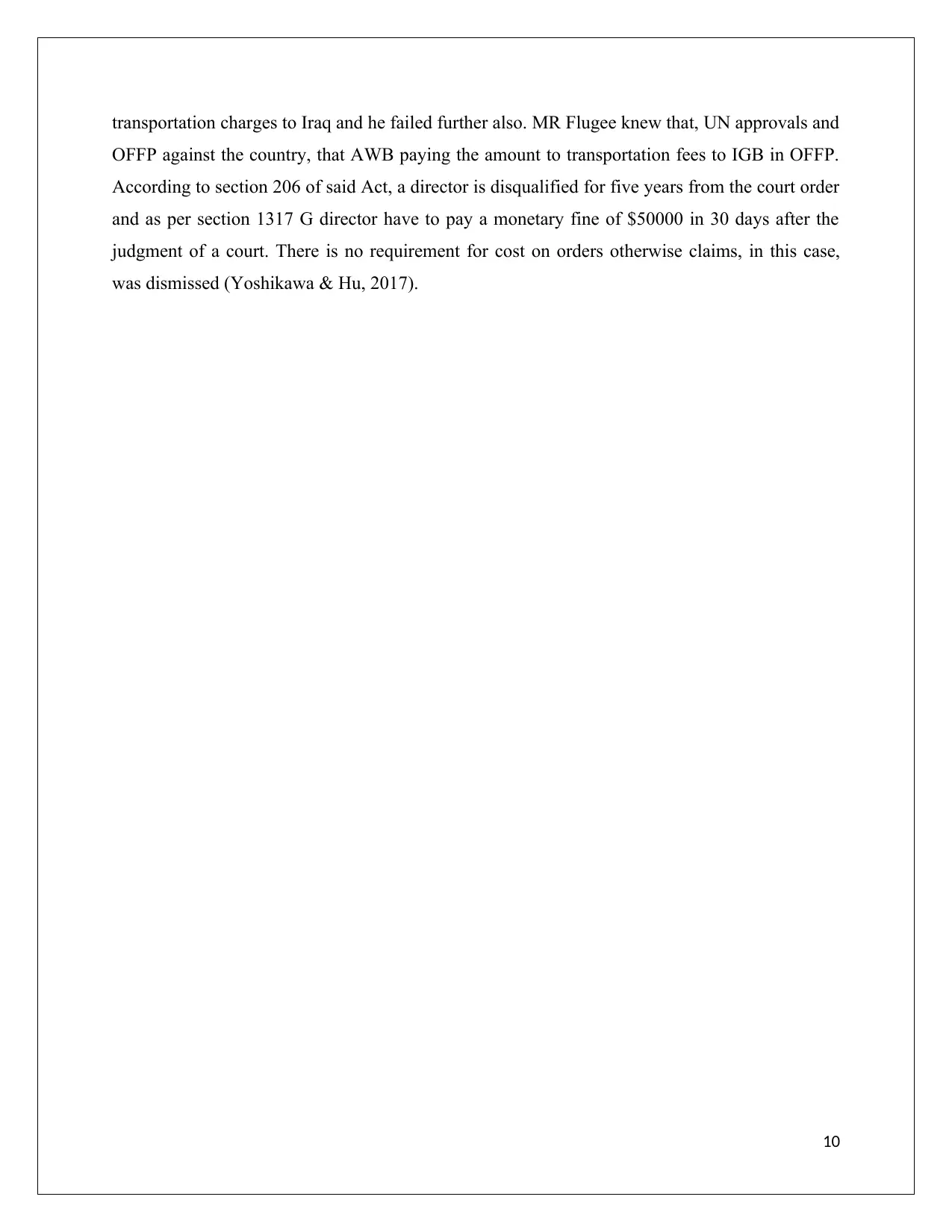
transportation charges to Iraq and he failed further also. MR Flugee knew that, UN approvals and
OFFP against the country, that AWB paying the amount to transportation fees to IGB in OFFP.
According to section 206 of said Act, a director is disqualified for five years from the court order
and as per section 1317 G director have to pay a monetary fine of $50000 in 30 days after the
judgment of a court. There is no requirement for cost on orders otherwise claims, in this case,
was dismissed (Yoshikawa & Hu, 2017).
10
OFFP against the country, that AWB paying the amount to transportation fees to IGB in OFFP.
According to section 206 of said Act, a director is disqualified for five years from the court order
and as per section 1317 G director have to pay a monetary fine of $50000 in 30 days after the
judgment of a court. There is no requirement for cost on orders otherwise claims, in this case,
was dismissed (Yoshikawa & Hu, 2017).
10
Paraphrase This Document
Need a fresh take? Get an instant paraphrase of this document with our AI Paraphraser
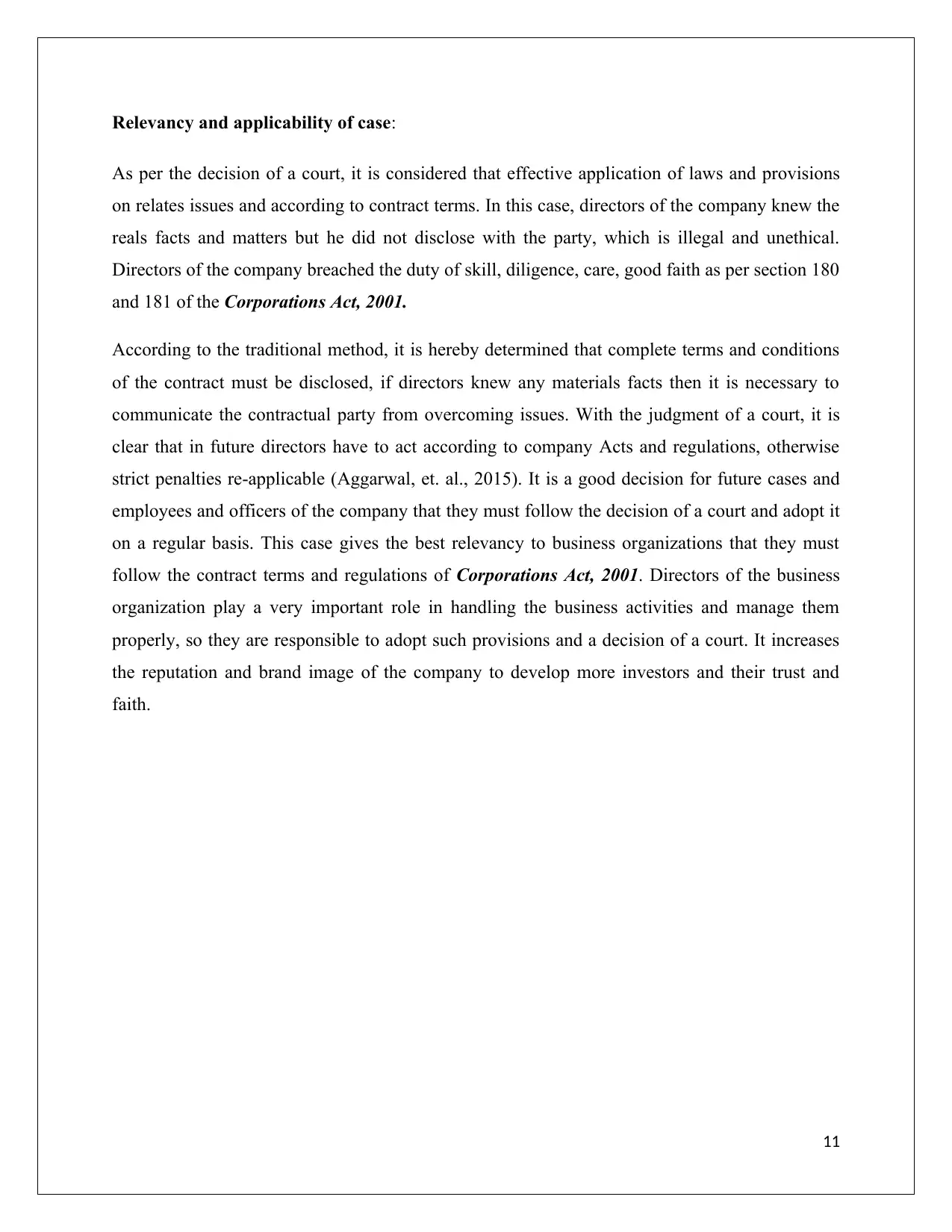
Relevancy and applicability of case:
As per the decision of a court, it is considered that effective application of laws and provisions
on relates issues and according to contract terms. In this case, directors of the company knew the
reals facts and matters but he did not disclose with the party, which is illegal and unethical.
Directors of the company breached the duty of skill, diligence, care, good faith as per section 180
and 181 of the Corporations Act, 2001.
According to the traditional method, it is hereby determined that complete terms and conditions
of the contract must be disclosed, if directors knew any materials facts then it is necessary to
communicate the contractual party from overcoming issues. With the judgment of a court, it is
clear that in future directors have to act according to company Acts and regulations, otherwise
strict penalties re-applicable (Aggarwal, et. al., 2015). It is a good decision for future cases and
employees and officers of the company that they must follow the decision of a court and adopt it
on a regular basis. This case gives the best relevancy to business organizations that they must
follow the contract terms and regulations of Corporations Act, 2001. Directors of the business
organization play a very important role in handling the business activities and manage them
properly, so they are responsible to adopt such provisions and a decision of a court. It increases
the reputation and brand image of the company to develop more investors and their trust and
faith.
11
As per the decision of a court, it is considered that effective application of laws and provisions
on relates issues and according to contract terms. In this case, directors of the company knew the
reals facts and matters but he did not disclose with the party, which is illegal and unethical.
Directors of the company breached the duty of skill, diligence, care, good faith as per section 180
and 181 of the Corporations Act, 2001.
According to the traditional method, it is hereby determined that complete terms and conditions
of the contract must be disclosed, if directors knew any materials facts then it is necessary to
communicate the contractual party from overcoming issues. With the judgment of a court, it is
clear that in future directors have to act according to company Acts and regulations, otherwise
strict penalties re-applicable (Aggarwal, et. al., 2015). It is a good decision for future cases and
employees and officers of the company that they must follow the decision of a court and adopt it
on a regular basis. This case gives the best relevancy to business organizations that they must
follow the contract terms and regulations of Corporations Act, 2001. Directors of the business
organization play a very important role in handling the business activities and manage them
properly, so they are responsible to adopt such provisions and a decision of a court. It increases
the reputation and brand image of the company to develop more investors and their trust and
faith.
11
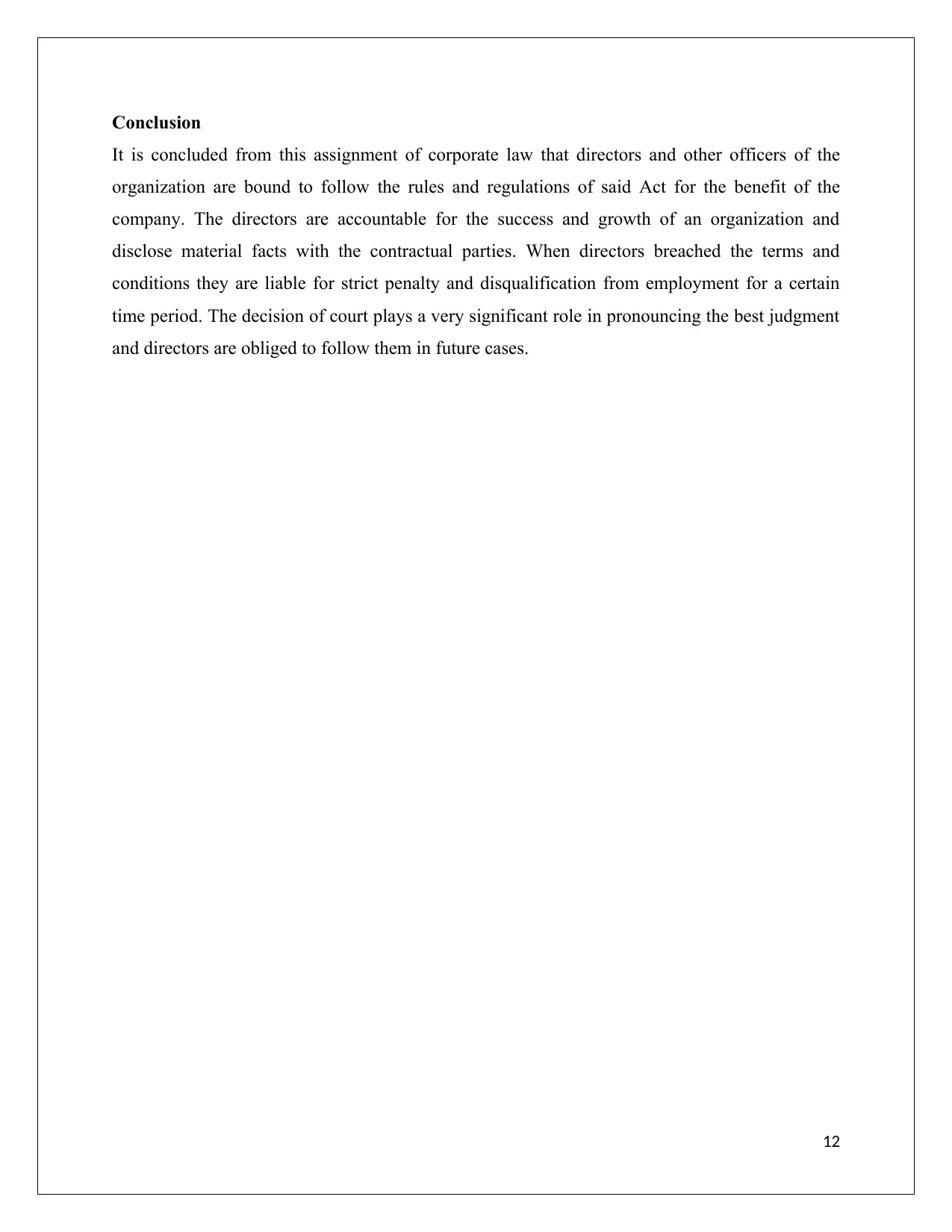
Conclusion
It is concluded from this assignment of corporate law that directors and other officers of the
organization are bound to follow the rules and regulations of said Act for the benefit of the
company. The directors are accountable for the success and growth of an organization and
disclose material facts with the contractual parties. When directors breached the terms and
conditions they are liable for strict penalty and disqualification from employment for a certain
time period. The decision of court plays a very significant role in pronouncing the best judgment
and directors are obliged to follow them in future cases.
12
It is concluded from this assignment of corporate law that directors and other officers of the
organization are bound to follow the rules and regulations of said Act for the benefit of the
company. The directors are accountable for the success and growth of an organization and
disclose material facts with the contractual parties. When directors breached the terms and
conditions they are liable for strict penalty and disqualification from employment for a certain
time period. The decision of court plays a very significant role in pronouncing the best judgment
and directors are obliged to follow them in future cases.
12
⊘ This is a preview!⊘
Do you want full access?
Subscribe today to unlock all pages.

Trusted by 1+ million students worldwide
1 out of 13
Related Documents
Your All-in-One AI-Powered Toolkit for Academic Success.
+13062052269
info@desklib.com
Available 24*7 on WhatsApp / Email
![[object Object]](/_next/static/media/star-bottom.7253800d.svg)
Unlock your academic potential
Copyright © 2020–2026 A2Z Services. All Rights Reserved. Developed and managed by ZUCOL.





